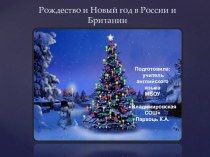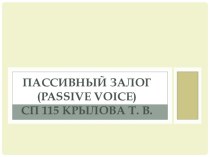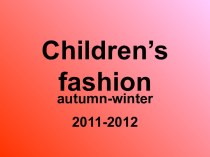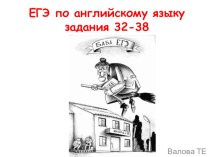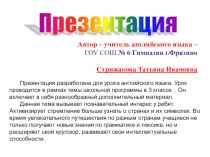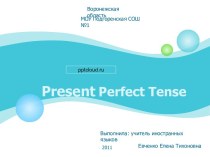- Главная
- Разное
- Бизнес и предпринимательство
- Образование
- Развлечения
- Государство
- Спорт
- Графика
- Культурология
- Еда и кулинария
- Лингвистика
- Религиоведение
- Черчение
- Физкультура
- ИЗО
- Психология
- Социология
- Английский язык
- Астрономия
- Алгебра
- Биология
- География
- Геометрия
- Детские презентации
- Информатика
- История
- Литература
- Маркетинг
- Математика
- Медицина
- Менеджмент
- Музыка
- МХК
- Немецкий язык
- ОБЖ
- Обществознание
- Окружающий мир
- Педагогика
- Русский язык
- Технология
- Физика
- Философия
- Химия
- Шаблоны, картинки для презентаций
- Экология
- Экономика
- Юриспруденция
Что такое findslide.org?
FindSlide.org - это сайт презентаций, докладов, шаблонов в формате PowerPoint.
Обратная связь
Email: Нажмите что бы посмотреть
Презентация на тему по английскому языку Borrowings
Содержание
- 2. TABLE OF CONTENT1. Introduction2. Definitions3. Reasons for
- 3. Borrowing words from other languages is characteristic
- 4. 1. TAKING A WORD
- 5. English history is very rich in different
- 6. 1 CLOSE CONTACT IN ESPECIALLY MULTILINGUAL SITUATIONS,
- 7. BORROWINGS ENTER THE LANGUAGE IN TWO WAYS:
- 8. WORD BORROWINGS IN ENGLISHANGLO-SAXON BASEGreekLatinScandinavianCelticFrenchOther languages
- 9. TYPES OF BORROWINGSBorrowings can be divided in
- 10. CLASSIFICATION OF BORROWINGS ACCORDING TO THE BORROWED
- 11. 2)Semantic borrowings are such units when a
- 12. 3)Morphemic borrowings are borrowings of affixes which
- 13. CLASSIFICATION OF BORROWINGS ACCORDING TO THE DEGREE
- 14. Completely assimilated borrowings are not felt as
- 15. Partly assimilated borrowings are subdivided into the
- 16. Non-assimilated borrowings (barbarisms) are borrowings which
- 17. CLASSIFICATION OF BORROWINGS ACCORDING TO THE LANGUAGE
- 18. French borrowingsThe largest group of borrowings are
- 19. SCANDINAVIAN BORROWINGSBy the end of the Old
- 20. ITALIAN BORROWINGS Cultural
- 21. Spanish borrowings came into English
- 22. GERMAN BORROWINGS There are some
- 23. HOLLAND BORROWINGS Holland and England
- 24. RUSSIAN BORROWINGS There were constant
- 25. ARABIC BORROWINGS ADMIRAL,ALBATROSS,ALCHEMY, ALGEBRA, CHEMISTRY,ALGORITHM,ATTAR, AVERAGE,ALMANAC,CARAT,CHESS, SHAHMAT,COFFEE,COTTON,HAREM, JAR,JASMIN,JUMPER,LEMON, ORANGE,MAGAZINE,SOFA,SAFARI, TALISMAN,TARIFF
- 26. THE WORD CANDY CAME INTO ENGLISH FROM THE FRENCH SUCRE
- 27. IN FRENCH, 'BIS' AND 'CUIT' MEANS 'TWICE
- 28. FROM TIN-OPENERS TO SMARTPHONES, MOST OF US
- 29. A SHEEP, A COW AND A PIG WENT TO MARKET, A MEAT
- 30. A MUSCLE IS IN FACT A LITTLE MOUSE, IF
- 31. ALCOHOL IS PROHIBITED IN SOME ARAB COUNTRIES,
- 32. THE WORD ROBOT WAS FIRST INTRODUCED BY THE CZECH
- 33. HELICOPTER WAS BORROWED FROM THE FRENCH WORD 'HÉLICOPTÈRE'.
- 34. DO YOU KNOW WHAT KARAOKE MEANS? IT MEANS 'EMPTY ORCHESTRA' IN JAPANESE AND IS WRITTEN カラオケ.
- 35. THE WORD MAGAZINE WAS DERIVED FROM THE ARABIC WORD
- 36. THE MARTIAL ART KARATE IS FROM JAPAN AND IS
- 37. THE WORD TENNIS COMES FROM THE FRENCH WORD 'TENEZ'
- 38. THE FRENCH GAVE US THE WORD SOUVENIR, FROM
- 39. BANK, TO DESCRIBE A FINANCIAL INSTITUTION, APPEARED
- 40. THE WORD COFFEE COMES FROM THE ARABIC WORD 'QAHWA'.
- 41. NOVEL COMES FROM THE ITALIAN WORD 'NOVELLA' AND ORIGINALLY MEANT 'NEW STORY'.
- 42. ORANGUTAN COMES FROM THE MALAY 'ORANG UTAN' WHICH
- 43. VOLCANO COMES FROM THE ITALIAN 'VULCANO', AND IS
- 44. Скачать презентацию
- 45. Похожие презентации
TABLE OF CONTENT1. Introduction2. Definitions3. Reasons for borrowings4. Types of borrowings5. General aspects6. List of borrowed words7. Conclusion
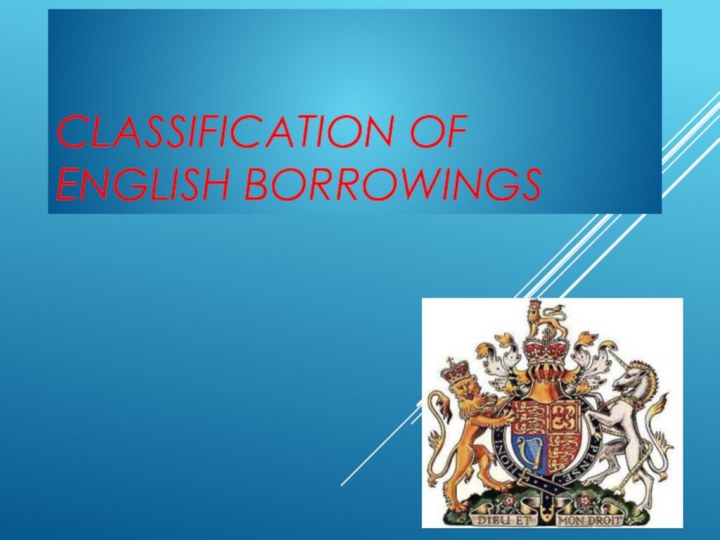
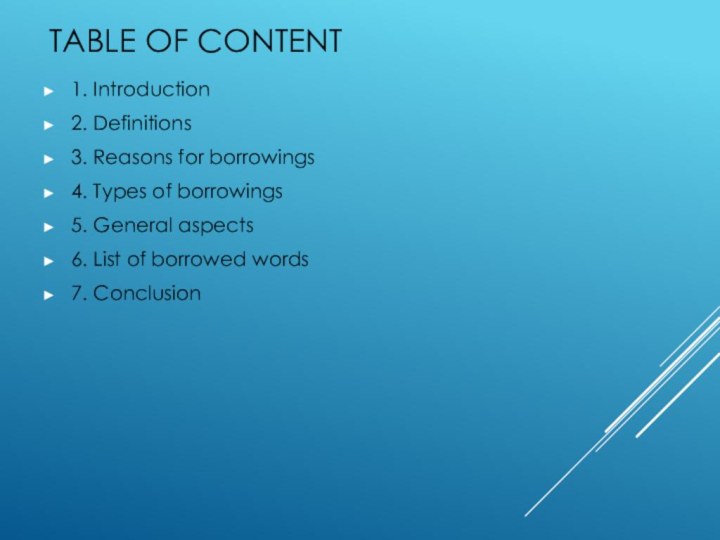
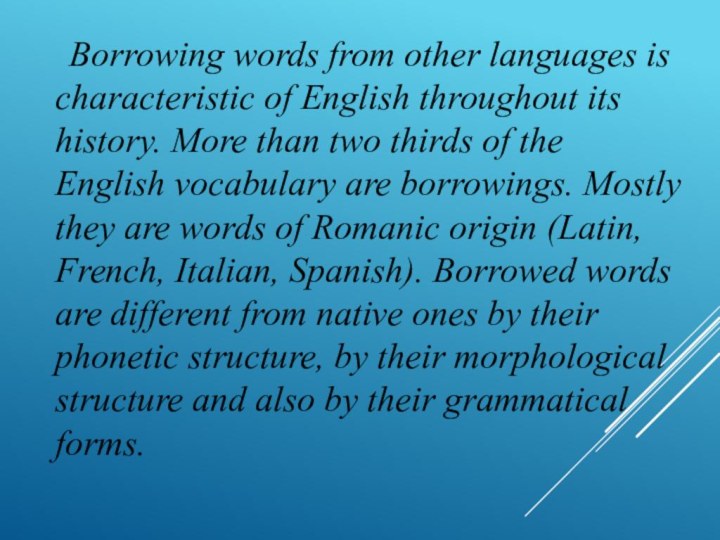
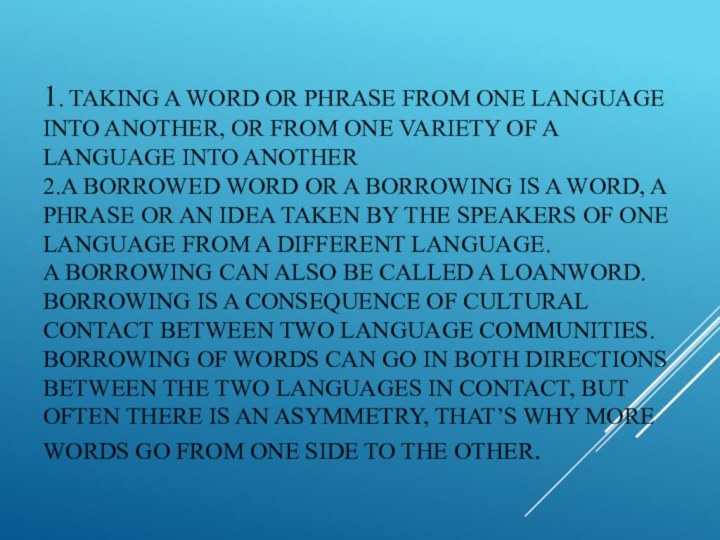
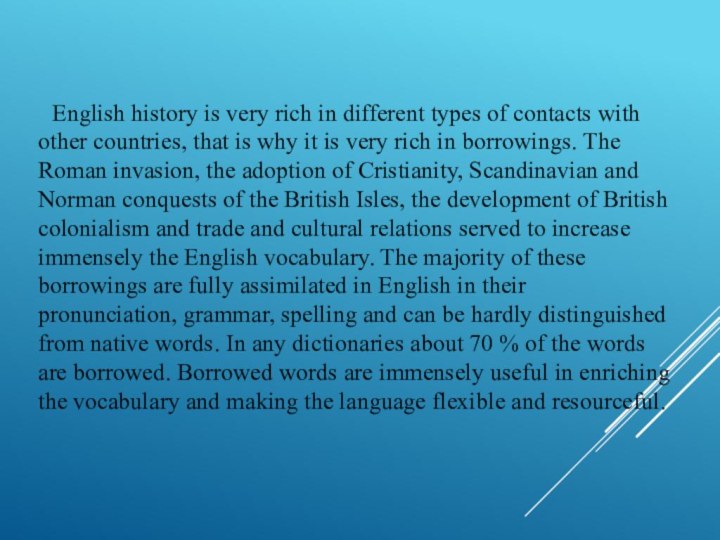
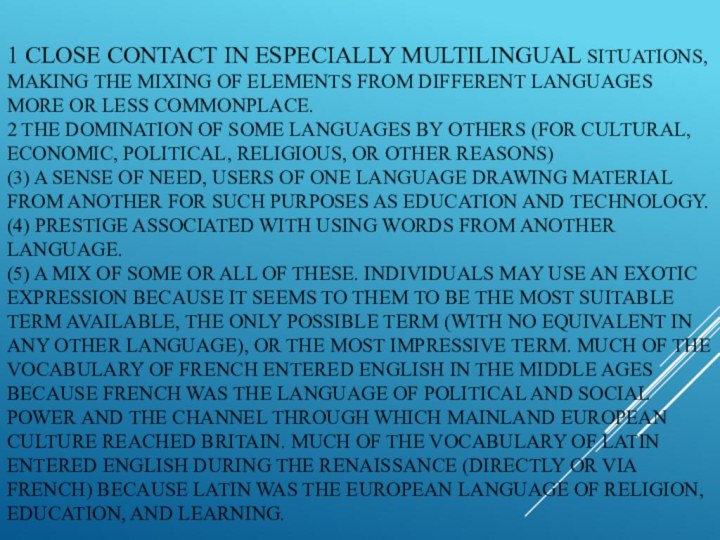

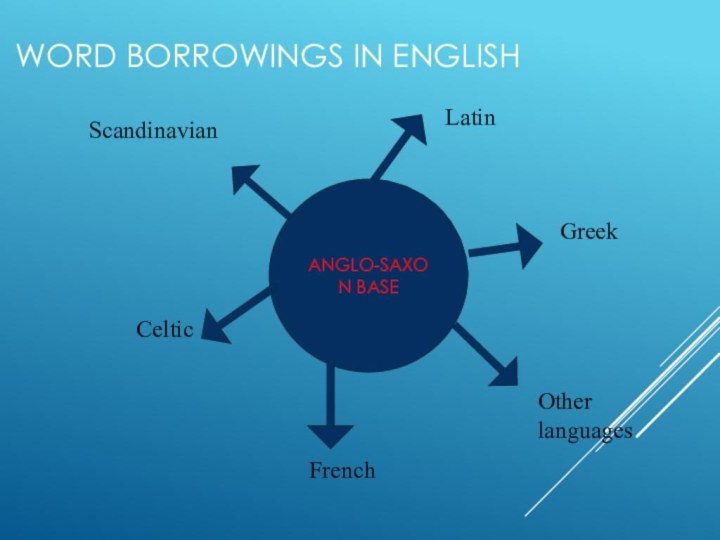
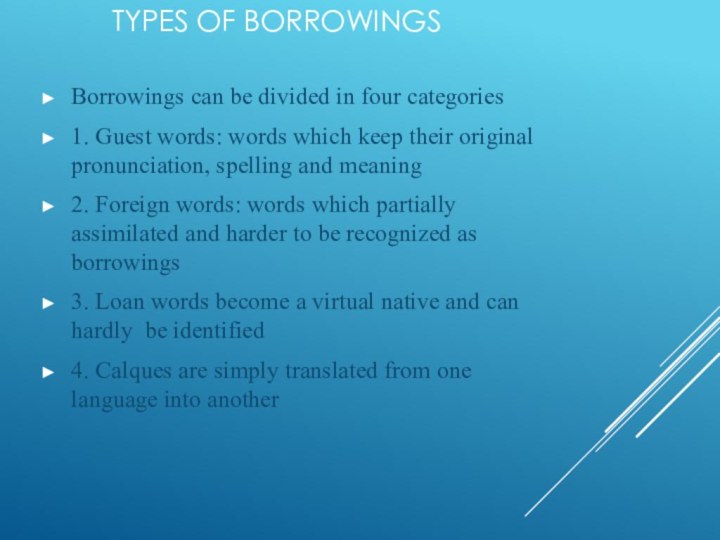
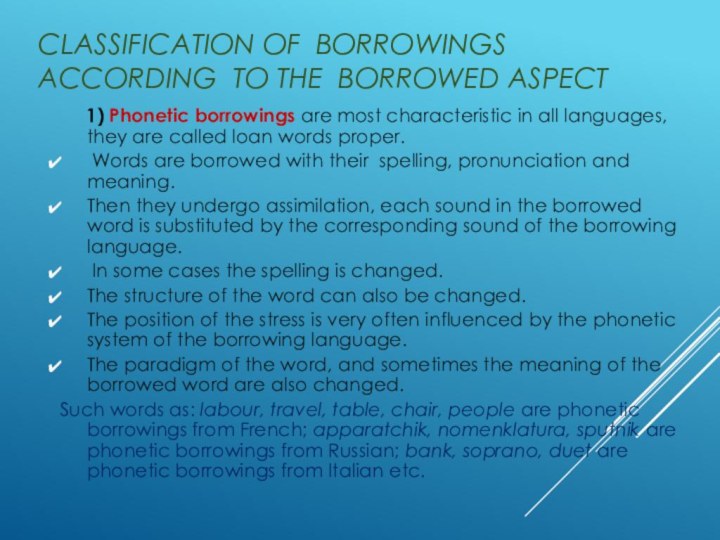
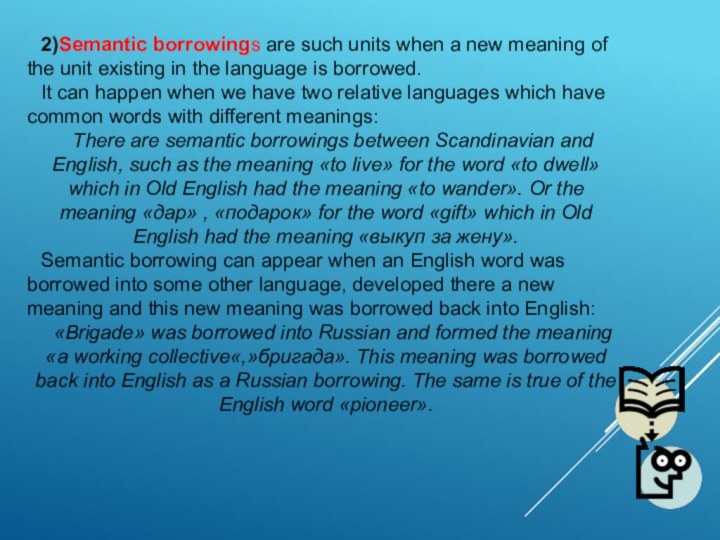
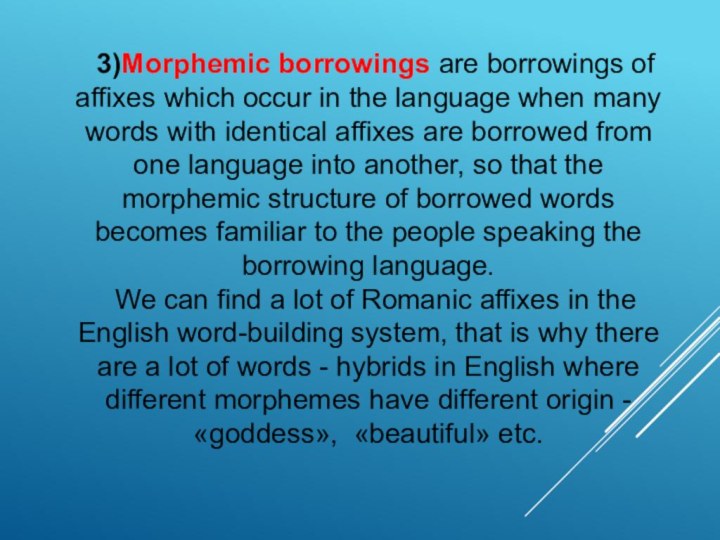
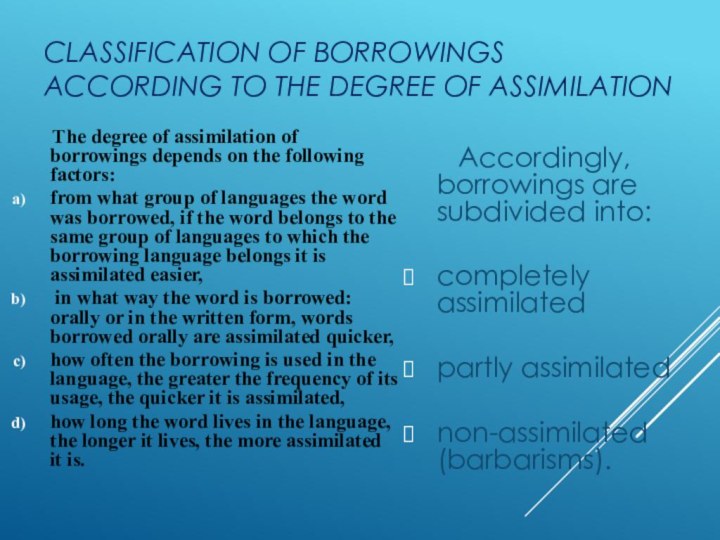
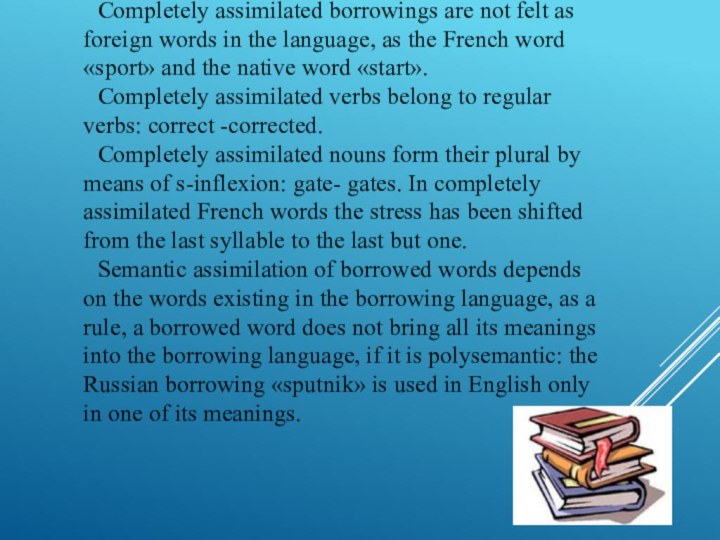

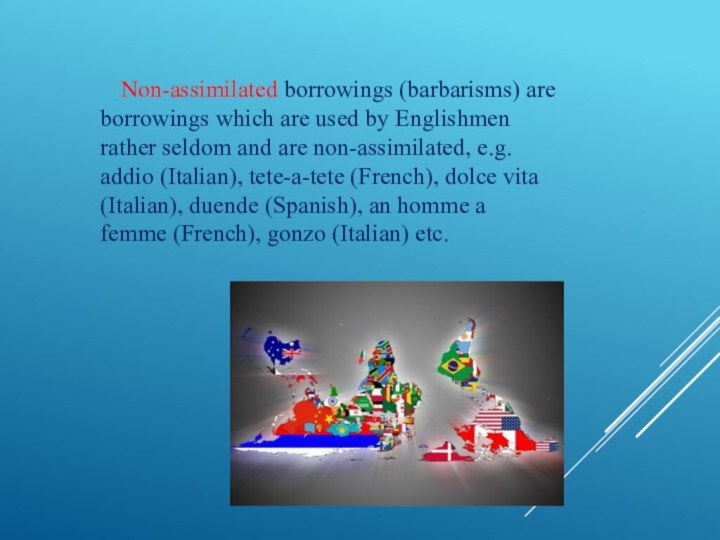
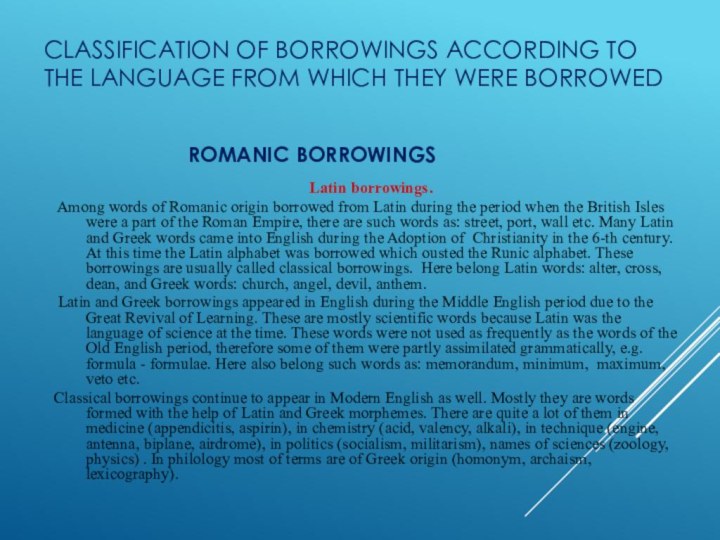
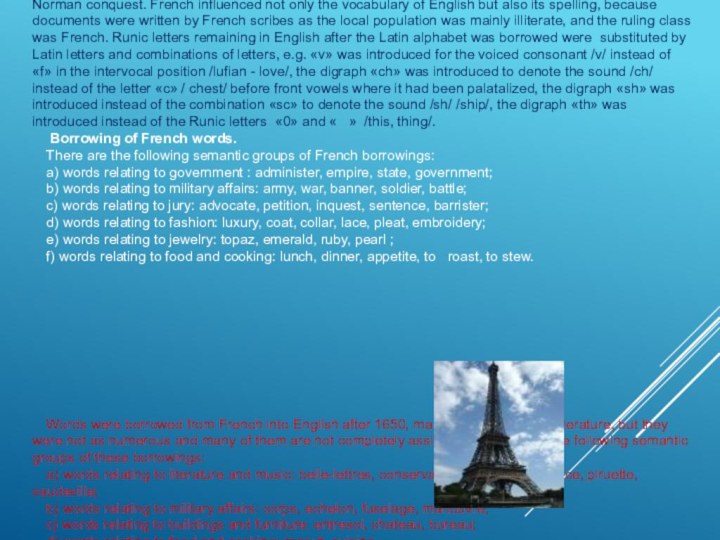
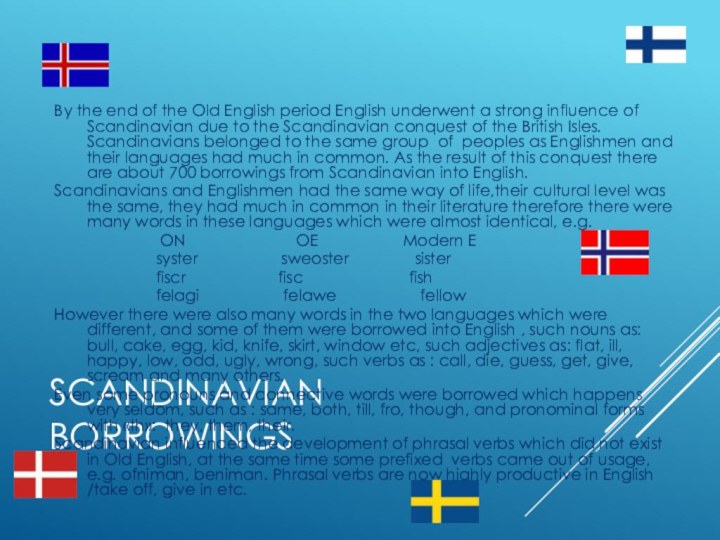
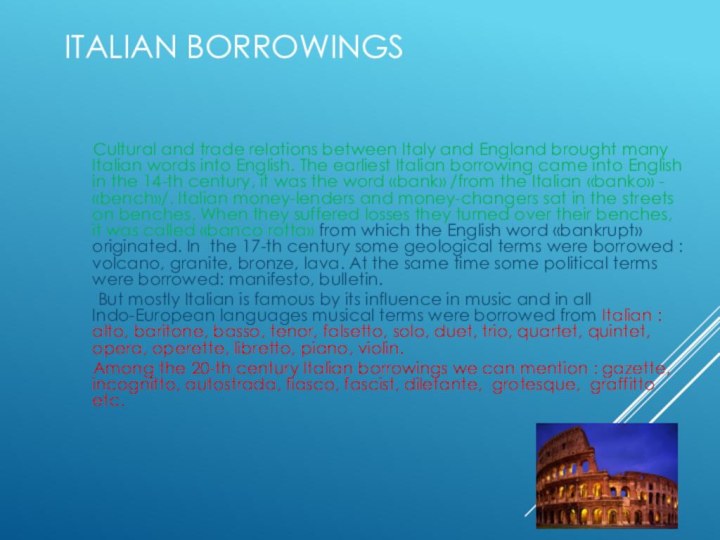
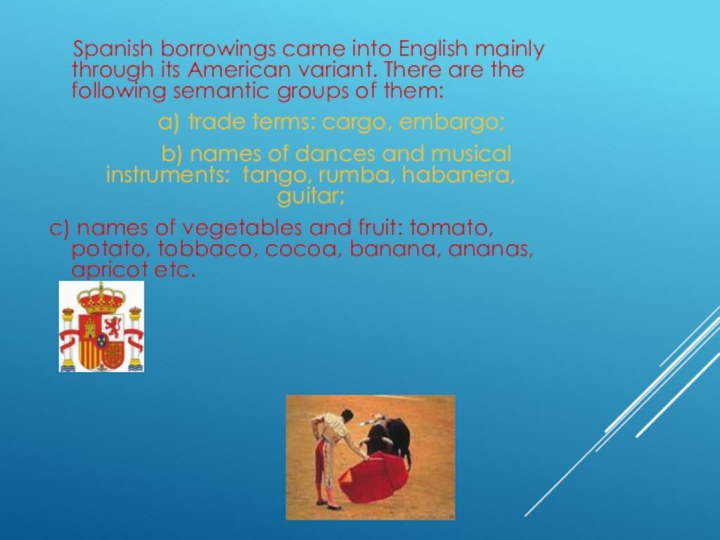

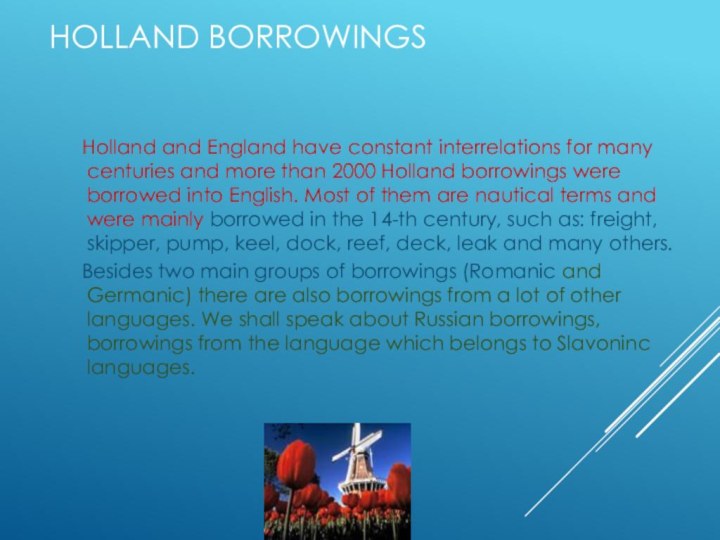
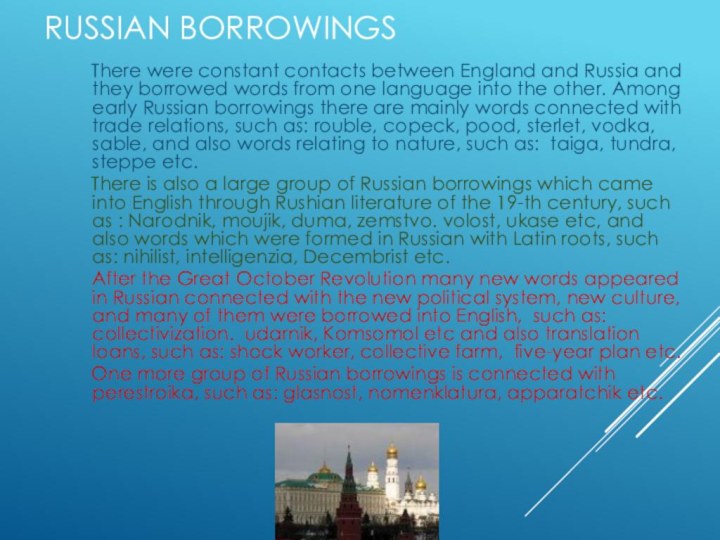



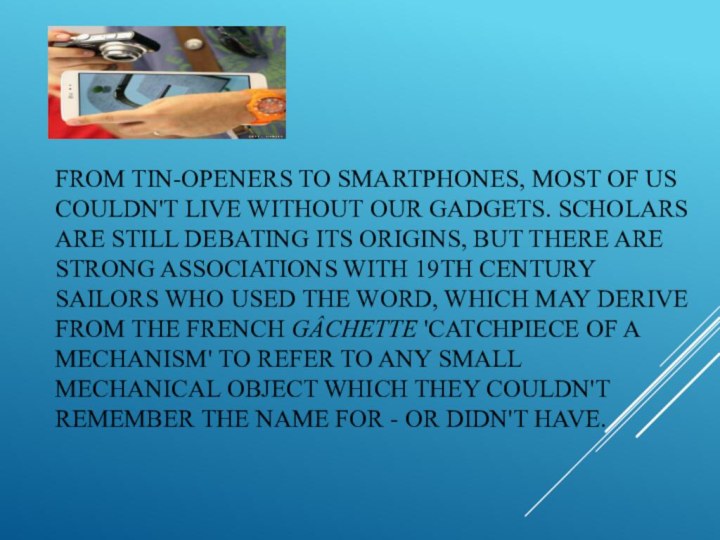






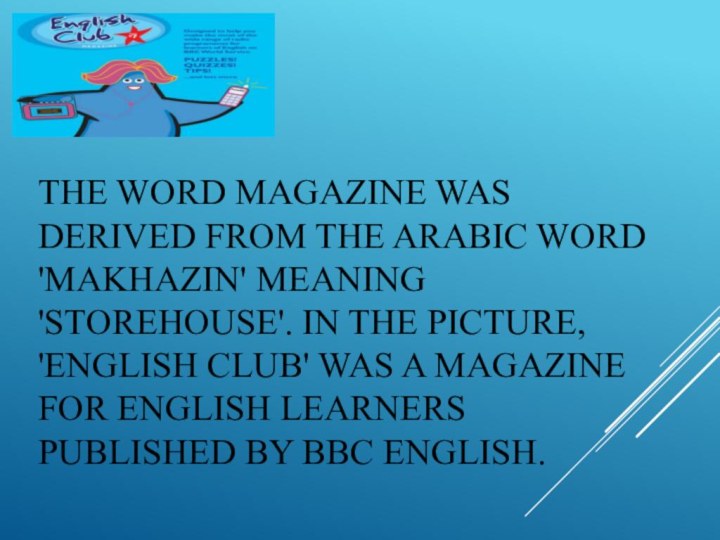





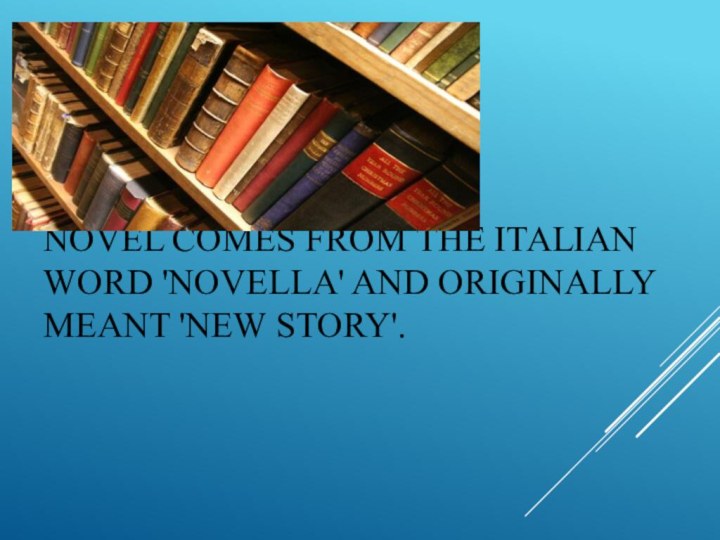



Слайд 2
TABLE OF CONTENT
1. Introduction
2. Definitions
3. Reasons for borrowings
4.
Types of borrowings
ConclusionСлайд 3 Borrowing words from other languages is characteristic of
English throughout its history. More than two thirds of
the English vocabulary are borrowings. Mostly they are words of Romanic origin (Latin, French, Italian, Spanish). Borrowed words are different from native ones by their phonetic structure, by their morphological structure and also by their grammatical forms.Слайд 4 1. TAKING A WORD OR PHRASE FROM ONE
LANGUAGE INTO ANOTHER, OR FROM ONE VARIETY OF A
LANGUAGE INTO ANOTHER 2.A BORROWED WORD OR A BORROWING IS A WORD, A PHRASE OR AN IDEA TAKEN BY THE SPEAKERS OF ONE LANGUAGE FROM A DIFFERENT LANGUAGE. A BORROWING CAN ALSO BE CALLED A LOANWORD. BORROWING IS A CONSEQUENCE OF CULTURAL CONTACT BETWEEN TWO LANGUAGE COMMUNITIES. BORROWING OF WORDS CAN GO IN BOTH DIRECTIONS BETWEEN THE TWO LANGUAGES IN CONTACT, BUT OFTEN THERE IS AN ASYMMETRY, THAT’S WHY MORE WORDS GO FROM ONE SIDE TO THE OTHER.Слайд 5 English history is very rich in different types
of contacts with other countries, that is why it
is very rich in borrowings. The Roman invasion, the adoption of Cristianity, Scandinavian and Norman conquests of the British Isles, the development of British colonialism and trade and cultural relations served to increase immensely the English vocabulary. The majority of these borrowings are fully assimilated in English in their pronunciation, grammar, spelling and can be hardly distinguished from native words. In any dictionaries about 70 % of the words are borrowed. Borrowed words are immensely useful in enriching the vocabulary and making the language flexible and resourceful.Слайд 6 1 CLOSE CONTACT IN ESPECIALLY MULTILINGUAL SITUATIONS, MAKING
THE MIXING OF ELEMENTS FROM DIFFERENT LANGUAGES MORE OR
LESS COMMONPLACE. 2 THE DOMINATION OF SOME LANGUAGES BY OTHERS (FOR CULTURAL, ECONOMIC, POLITICAL, RELIGIOUS, OR OTHER REASONS) (3) A SENSE OF NEED, USERS OF ONE LANGUAGE DRAWING MATERIAL FROM ANOTHER FOR SUCH PURPOSES AS EDUCATION AND TECHNOLOGY. (4) PRESTIGE ASSOCIATED WITH USING WORDS FROM ANOTHER LANGUAGE. (5) A MIX OF SOME OR ALL OF THESE. INDIVIDUALS MAY USE AN EXOTIC EXPRESSION BECAUSE IT SEEMS TO THEM TO BE THE MOST SUITABLE TERM AVAILABLE, THE ONLY POSSIBLE TERM (WITH NO EQUIVALENT IN ANY OTHER LANGUAGE), OR THE MOST IMPRESSIVE TERM. MUCH OF THE VOCABULARY OF FRENCH ENTERED ENGLISH IN THE MIDDLE AGES BECAUSE FRENCH WAS THE LANGUAGE OF POLITICAL AND SOCIAL POWER AND THE CHANNEL THROUGH WHICH MAINLAND EUROPEAN CULTURE REACHED BRITAIN. MUCH OF THE VOCABULARY OF LATIN ENTERED ENGLISH DURING THE RENAISSANCE (DIRECTLY OR VIA FRENCH) BECAUSE LATIN WAS THE EUROPEAN LANGUAGE OF RELIGION, EDUCATION, AND LEARNING.Слайд 7 BORROWINGS ENTER THE LANGUAGE IN TWO WAYS: THROUGH ORAL
SPEECH AND THROUGH WRITTEN SPEECH(BY INDIRECT CONTACT THROUGH BOOKS)
Слайд 9
TYPES OF BORROWINGS
Borrowings can be divided in four
categories
1. Guest words: words which keep their original pronunciation,
spelling and meaning2. Foreign words: words which partially assimilated and harder to be recognized as borrowings
3. Loan words become a virtual native and can hardly be identified
4. Calques are simply translated from one language into another
Слайд 10
CLASSIFICATION OF BORROWINGS ACCORDING TO THE BORROWED ASPECT
1) Phonetic borrowings are most characteristic in
all languages, they are called loan words proper.Words are borrowed with their spelling, pronunciation and meaning.
Then they undergo assimilation, each sound in the borrowed word is substituted by the corresponding sound of the borrowing language.
In some cases the spelling is changed.
The structure of the word can also be changed.
The position of the stress is very often influenced by the phonetic system of the borrowing language.
The paradigm of the word, and sometimes the meaning of the borrowed word are also changed.
Such words as: labour, travel, table, chair, people are phonetic borrowings from French; apparatchik, nomenklatura, sputnik are phonetic borrowings from Russian; bank, soprano, duet are phonetic borrowings from Italian etc.
Слайд 11 2)Semantic borrowings are such units when a new
meaning of the unit existing in the language is
borrowed.It can happen when we have two relative languages which have common words with different meanings:
There are semantic borrowings between Scandinavian and English, such as the meaning «to live» for the word «to dwell» which in Old English had the meaning «to wander». Or the meaning «дар» , «подарок» for the word «gift» which in Old English had the meaning «выкуп за жену».
Semantic borrowing can appear when an English word was borrowed into some other language, developed there a new meaning and this new meaning was borrowed back into English:
«Brigade» was borrowed into Russian and formed the meaning «a working collective«,»бригада». This meaning was borrowed back into English as a Russian borrowing. The same is true of the English word «pioneer».
Слайд 12 3)Morphemic borrowings are borrowings of affixes which occur
in the language when many words with identical affixes
are borrowed from one language into another, so that the morphemic structure of borrowed words becomes familiar to the people speaking the borrowing language.We can find a lot of Romanic affixes in the English word-building system, that is why there are a lot of words - hybrids in English where different morphemes have different origin - «goddess», «beautiful» etc.
Слайд 13 CLASSIFICATION OF BORROWINGS ACCORDING TO THE DEGREE OF
ASSIMILATION
Accordingly, borrowings are subdivided into:
completely
assimilatedpartly assimilated
non-assimilated (barbarisms).
The degree of assimilation of borrowings depends on the following factors:
from what group of languages the word was borrowed, if the word belongs to the same group of languages to which the borrowing language belongs it is assimilated easier,
in what way the word is borrowed: orally or in the written form, words borrowed orally are assimilated quicker,
how often the borrowing is used in the language, the greater the frequency of its usage, the quicker it is assimilated,
how long the word lives in the language, the longer it lives, the more assimilated it is.
Слайд 14 Completely assimilated borrowings are not felt as foreign
words in the language, as the French word «sport»
and the native word «start».Completely assimilated verbs belong to regular verbs: correct -corrected.
Completely assimilated nouns form their plural by means of s-inflexion: gate- gates. In completely assimilated French words the stress has been shifted from the last syllable to the last but one.
Semantic assimilation of borrowed words depends on the words existing in the borrowing language, as a rule, a borrowed word does not bring all its meanings into the borrowing language, if it is polysemantic: the Russian borrowing «sputnik» is used in English only in one of its meanings.
Слайд 15 Partly assimilated borrowings are subdivided into the following
groups:
a) borrowings non-assimilated semantically, because they denote objects
and notions peculiar to the country from the language of which they were borrowed, e.g. sari, sombrero, taiga, kvass etc.b) borrowings non-assimilated grammatically, e.g. nouns borrowed from Latin and Greek retain their plural forms (bacillus - bacilli, phenomenon - phenomena, datum -data, genius - genii etc.
c) borrowings non-assimilated phonetically. Here belong words with the initial sounds /v/ and /z/, e.g. voice, zero. In native words these voiced consonants are used only in the intervocal position as allophones of sounds /f/ and /s/ ( loss - lose, life - live ). Some Scandinavian borrowings have consonants and combinations of consonants which were not palatalized, e.g. /sk/ in the words: sky, skate, ski etc (in native words we have the palatalized sounds denoted by the digraph «sh», e.g. shirt); sounds /k/ and /g/ before front vowels are not palatalized e.g. girl, get, give, kid, kill, kettle. In native words we have palatalization , e.g. German, child.
d) borrowings can be partly assimilated graphically, e.g. in Greek borrowings «y» can be spelled in the middle of the word (symbol, synonym), «ph» denotes the sound /f/ (phoneme, morpheme), «ch» denotes the sound /k/(chemistry, chaos),«ps» denotes the sound /s/ (psychology).
Слайд 16 Non-assimilated borrowings (barbarisms) are borrowings which are
used by Englishmen rather seldom and are non-assimilated, e.g.
addio (Italian), tete-a-tete (French), dolce vita (Italian), duende (Spanish), an homme a femme (French), gonzo (Italian) etc.Слайд 17 CLASSIFICATION OF BORROWINGS ACCORDING TO THE LANGUAGE FROM
WHICH THEY WERE BORROWED
ROMANIC BORROWINGSLatin borrowings.
Among words of Romanic origin borrowed from Latin during the period when the British Isles were a part of the Roman Empire, there are such words as: street, port, wall etc. Many Latin and Greek words came into English during the Adoption of Christianity in the 6-th century. At this time the Latin alphabet was borrowed which ousted the Runic alphabet. These borrowings are usually called classical borrowings. Here belong Latin words: alter, cross, dean, and Greek words: church, angel, devil, anthem.
Latin and Greek borrowings appeared in English during the Middle English period due to the Great Revival of Learning. These are mostly scientific words because Latin was the language of science at the time. These words were not used as frequently as the words of the Old English period, therefore some of them were partly assimilated grammatically, e.g. formula - formulae. Here also belong such words as: memorandum, minimum, maximum, veto etc.
Classical borrowings continue to appear in Modern English as well. Mostly they are words formed with the help of Latin and Greek morphemes. There are quite a lot of them in medicine (appendicitis, aspirin), in chemistry (acid, valency, alkali), in technique (engine, antenna, biplane, airdrome), in politics (socialism, militarism), names of sciences (zoology, physics) . In philology most of terms are of Greek origin (homonym, archaism, lexicography).
Слайд 18
French borrowings
The largest group of borrowings are French
borrowings. Most of them came into English during the
Norman conquest. French influenced not only the vocabulary of English but also its spelling, because documents were written by French scribes as the local population was mainly illiterate, and the ruling class was French. Runic letters remaining in English after the Latin alphabet was borrowed were substituted by Latin letters and combinations of letters, e.g. «v» was introduced for the voiced consonant /v/ instead of «f» in the intervocal position /lufian - love/, the digraph «ch» was introduced to denote the sound /ch/ instead of the letter «c» / chest/ before front vowels where it had been palatalized, the digraph «sh» was introduced instead of the combination «sc» to denote the sound /sh/ /ship/, the digraph «th» was introduced instead of the Runic letters «0» and « » /this, thing/.Borrowing of French words.
There are the following semantic groups of French borrowings:
a) words relating to government : administer, empire, state, government;
b) words relating to military affairs: army, war, banner, soldier, battle;
c) words relating to jury: advocate, petition, inquest, sentence, barrister;
d) words relating to fashion: luxury, coat, collar, lace, pleat, embroidery;
e) words relating to jewelry: topaz, emerald, ruby, pearl ;
f) words relating to food and cooking: lunch, dinner, appetite, to roast, to stew.
Words were borrowed from French into English after 1650, mainly through French literature, but they were not as numerous and many of them are not completely assimilated. There are the following semantic groups of these borrowings:
a) words relating to literature and music: belle-lettres, conservatorie, brochure, nuance, piruette, vaudeville;
b) words relating to military affairs: corps, echelon, fuselage, manouvre;
c) words relating to buildings and furniture: entresol, chateau, bureau;
d) words relating to food and cooking: ragout, cuisine.
Слайд 19
SCANDINAVIAN BORROWINGS
By the end of the Old English
period English underwent a strong influence of Scandinavian due
to the Scandinavian conquest of the British Isles. Scandinavians belonged to the same group of peoples as Englishmen and their languages had much in common. As the result of this conquest there are about 700 borrowings from Scandinavian into English.Scandinavians and Englishmen had the same way of life,their cultural level was the same, they had much in common in their literature therefore there were many words in these languages which were almost identical, e.g.
ON OE Modern E
syster sweoster sister
fiscr fisc fish
felagi felawe fellow
However there were also many words in the two languages which were different, and some of them were borrowed into English , such nouns as: bull, cake, egg, kid, knife, skirt, window etc, such adjectives as: flat, ill, happy, low, odd, ugly, wrong, such verbs as : call, die, guess, get, give, scream and many others.
Even some pronouns and connective words were borrowed which happens very seldom, such as : same, both, till, fro, though, and pronominal forms with «th»: they, them, their.
Scandinavian influenced the development of phrasal verbs which did not exist in Old English, at the same time some prefixed verbs came out of usage, e.g. ofniman, beniman. Phrasal verbs are now highly productive in English /take off, give in etc.
Слайд 20
ITALIAN BORROWINGS
Cultural and
trade relations between Italy and England brought many Italian
words into English. The earliest Italian borrowing came into English in the 14-th century, it was the word «bank» /from the Italian «banko» - «bench»/. Italian money-lenders and money-changers sat in the streets on benches. When they suffered losses they turned over their benches, it was called «banco rotta» from which the English word «bankrupt» originated. In the 17-th century some geological terms were borrowed : volcano, granite, bronze, lava. At the same time some political terms were borrowed: manifesto, bulletin.But mostly Italian is famous by its influence in music and in all Indo-European languages musical terms were borrowed from Italian : alto, baritone, basso, tenor, falsetto, solo, duet, trio, quartet, quintet, opera, operette, libretto, piano, violin.
Among the 20-th century Italian borrowings we can mention : gazette, incognitto, autostrada, fiasco, fascist, diletante, grotesque, graffitto etc.
Слайд 21 Spanish borrowings came into English mainly
through its American variant. There are the following semantic
groups of them:a) trade terms: cargo, embargo;
b) names of dances and musical instruments: tango, rumba, habanera, guitar;
c) names of vegetables and fruit: tomato, potato, tobbaco, cocoa, banana, ananas, apricot etc.
Слайд 22
GERMAN BORROWINGS
There are some 800
words borrowed from German into English. Some of them
have classical roots, e.g. in some geological terms, such as: cobalt, bismuth, zink, quarts, gneiss, wolfram. There were also words denoting objects used in everyday life which were borrowed from German: iceberg, lobby, rucksack, Kindergarten etc.In the period of the Second World War the following words were borrowed: Volkssturm, Luftwaffe, SS-man, Bundeswehr, gestapo, gas chamber and many others.
Слайд 23
HOLLAND BORROWINGS
Holland and England have
constant interrelations for many centuries and more than 2000
Holland borrowings were borrowed into English. Most of them are nautical terms and were mainly borrowed in the 14-th century, such as: freight, skipper, pump, keel, dock, reef, deck, leak and many others.Besides two main groups of borrowings (Romanic and Germanic) there are also borrowings from a lot of other languages. We shall speak about Russian borrowings, borrowings from the language which belongs to Slavoninc languages.
Слайд 24
RUSSIAN BORROWINGS
There were constant contacts
between England and Russia and they borrowed words from
one language into the other. Among early Russian borrowings there are mainly words connected with trade relations, such as: rouble, copeck, pood, sterlet, vodka, sable, and also words relating to nature, such as: taiga, tundra, steppe etc.There is also a large group of Russian borrowings which came into English through Rushian literature of the 19-th century, such as : Narodnik, moujik, duma, zemstvo. volost, ukase etc, and also words which were formed in Russian with Latin roots, such as: nihilist, intelligenzia, Decembrist etc.
After the Great October Revolution many new words appeared in Russian connected with the new political system, new culture, and many of them were borrowed into English, such as: collectivization. udarnik, Komsomol etc and also translation loans, such as: shock worker, collective farm, five-year plan etc.
One more group of Russian borrowings is connected with perestroika, such as: glasnost, nomenklatura, apparatchik etc.






